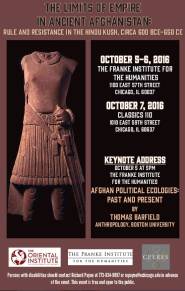 The Oriental Institute and the Franke Institute for the Humanities, University of Chicago, announce a conference to be held October 5-7, 2016.
The Oriental Institute and the Franke Institute for the Humanities, University of Chicago, announce a conference to be held October 5-7, 2016.
The Limits of Empire in Afghanistan: Rule and Resistance in the Hindu Kush, circa 600 BCE-650 CE
In the first millennia BCE and CE, successive empires sought to incorporate the archipelago of territories in and around the Hindu Kush and to install their structures of rule. The Achaemenians, Seleucids, and Sasanians endeavored — and sometimes pretended — to rule regions of Afghanistan from their courts located in the Near Eastern core, upward of 2500 km distant. The Kushans, for their part, made Bactra and Begram the bases of an empire that extended far beyond into India and Central Asia. Apart from distance, these empires confronted a political geography in the Hindu Kush that was — like the Caucasus — uniquely unfavorable to imperial governance, as well as populations with disparate cultures, social structures, and political traditions. Afghanistan thus provides a test of the capacities of ancient imperial regimes to overcome distance, verticality, and difference to integrate territories into their trans-regional and trans-cultural orders. As even a passing familiarity with the history of the region suggests, efforts at empire failed at least as often as they succeeded in a geographical and cultural landscape highly conducive what James Scott calls the “art[s] of not being governed.” The conference aims to focus on the limits of empire in Afghanistan, as a means of better comprehending the workings of the regimes that laid claim to its territories and the responses of its populations.
The conference convenes archaeologists, art historians, historians, philologists, and numismatists to debate current research in the context of ongoing theoretical debates concerning the formation, endurance, and limits of imperial systems within a highland political ecology.
For a detailed programme and abstracts, see Symposium: The Limits of Empire in Afghanistan | The Oriental Institute of the University of Chicago.